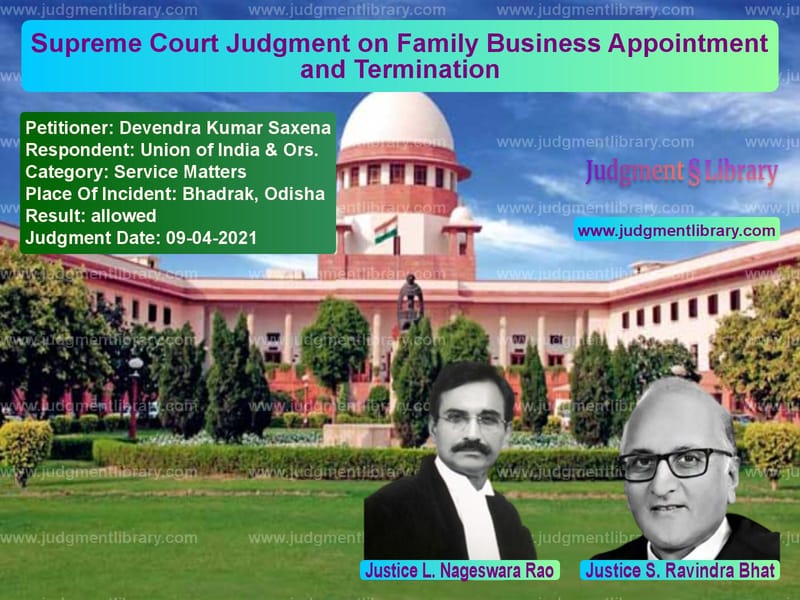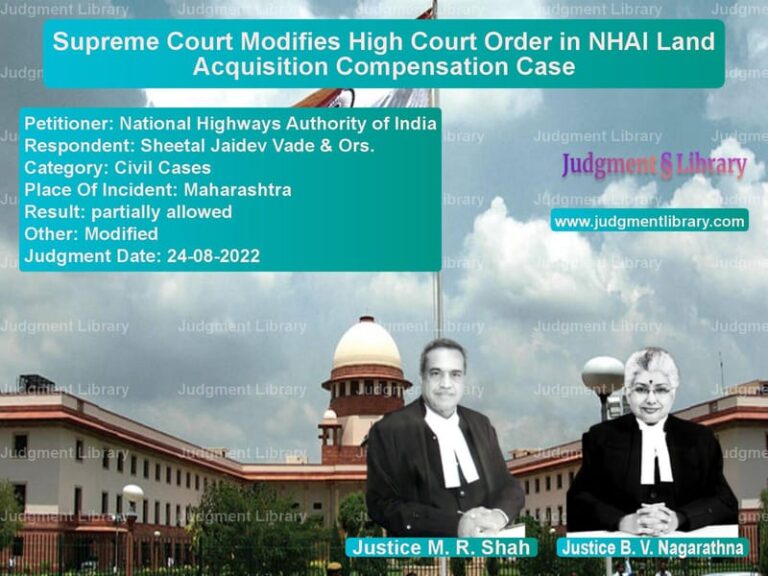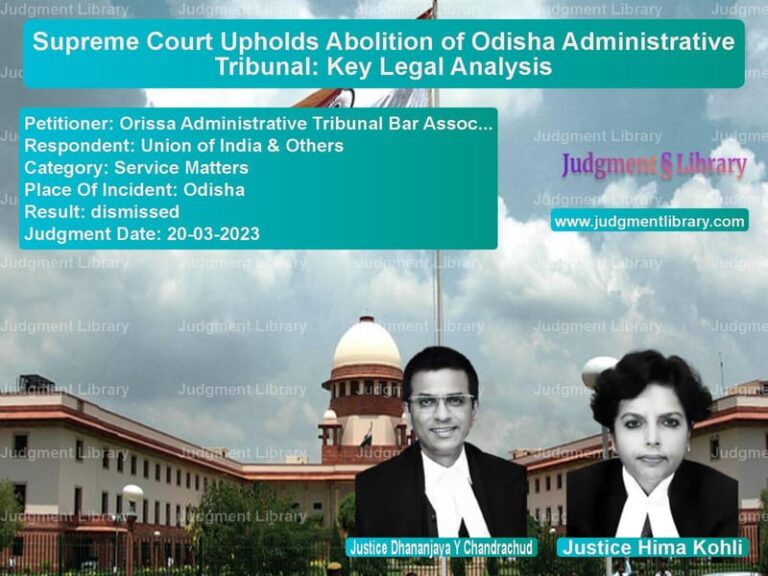Supreme Court Judgment on Family Business Appointment and Termination
The Supreme Court of India recently delivered a judgment in the case of State of Odisha & Ors. v. Kamalini Khilar & Anr., addressing a family dispute in the context of government recruitment and termination. The case involved the appointment and termination of a teacher in a primary school in Bhadrak, Odisha, and the interpretation of employment laws related to the appointment of candidates under specific categories, including Socially and Educationally Backward Classes (SEBC).
Background of the Case
The matter began in 1996 when the State of Odisha issued a recruitment resolution for primary school teachers in government schools. The resolution detailed the recruitment procedure, including the number of vacancies available for different categories, such as SEBC (Women). Kamalini Khilar, the respondent, was selected under the SEBC (Women) category and was appointed to the position of a primary school teacher in Bhadrak in 1998.
However, in 2002, her appointment was terminated after the State Administrative Tribunal (SAT) ruled in favor of a candidate named Snehalata Nayak, who had a higher merit rank. The SAT’s ruling required the state to appoint Snehalata Nayak and terminate the services of the person who had been appointed in her place, Kamalini Khilar.
Following the termination, Kamalini Khilar approached the Orissa High Court and challenged her dismissal. The High Court directed the state to appoint her in any available vacancies in Bhadrak district, but the state contested the High Court’s ruling, arguing that the appointment was made against the prescribed procedures.
Petitioner’s Arguments (State of Odisha and Appellants)
- The appellants contended that the appointment of Kamalini Khilar was made only because the person who had secured the 16th position in the merit list, Snehalata Nayak, did not report for duty.
- The appellants argued that the termination of Kamalini Khilar’s services was in compliance with the directions issued by the Tribunal in response to a petition filed by Snehalata Nayak.
- The appellants emphasized that the process of recruitment and appointment was conducted as per the rules and that the termination was due to the legal necessity of appointing the rightful candidate, as per the Tribunal’s ruling.
- The appellants further argued that Kamalini Khilar’s appointment was never final, and her appointment was made under exceptional circumstances.
Respondent’s Arguments (Kamalini Khilar)
- The respondent contended that the termination of her services was illegal and violated the principles of natural justice.
- Kamalini Khilar argued that she was a permanent employee who had worked for four years with impeccable service and had not been provided with an opportunity to be heard before her services were terminated.
- The respondent pointed out that the Tribunal’s order did not direct her termination, but only addressed the issue of the wrongly appointed individual, and thus her dismissal was unfair.
- She also argued that her termination, after serving for years, was arbitrary and caused undue hardship to her and her family.
Supreme Court’s Analysis and Judgment
The Supreme Court examined the facts and legal arguments carefully, especially focusing on the process of recruitment, appointment, and termination. The Court made the following key observations:
- “The termination order passed by the State was not in accordance with the legal requirements, and Kamalini Khilar was entitled to be heard before any termination.”
- “The appellant state was bound to comply with the Tribunal’s order but had failed to follow proper procedure in terminating Kamalini Khilar’s services.”
- “Even though the Tribunal had ruled in favor of the other candidate, Snehalata Nayak, Kamalini’s termination was not legally justified without due process.”
- “In such matters, principles of natural justice should be followed, and no person should be deprived of their right to be heard in cases that affect their employment.”
The Court held that Kamalini Khilar’s termination was not in line with the law, and that the decision to reinstate her to a vacancy was justified. The ruling also reinforced the requirement of fair procedure and notice in cases involving termination, especially when no disciplinary charges were involved.
The Court did, however, modify the direction given by the High Court. While Kamalini Khilar could be appointed, the Court held that her reinstatement could only happen if a vacancy existed. The appellants were instructed to make the appointment within four weeks of the ruling, subject to the availability of a vacancy in Bhadrak.
Key Legal Principles Reinforced by the Judgment
- Principle of Natural Justice: The Court emphasized the requirement to provide a person an opportunity to be heard before terminating their employment, especially in the absence of any misconduct or disciplinary grounds.
- Binding Effect of Tribunal Orders: The judgment reinforced that orders from legal tribunals, such as the State Administrative Tribunal, are binding unless overturned by competent courts.
- Vacancy Allocation and Fair Appointment Procedures: The Court reiterated that the allocation of vacancies must be done according to the prescribed rules and within the categories of recruitment.
Impact of the Judgment
This ruling is significant in terms of ensuring fairness in the recruitment process, especially in government jobs. It clarifies that even when appointments are made under emergency circumstances or due to vacancies created by others’ non-joining, the process must comply with legal standards. Furthermore, the Court’s focus on natural justice is a reminder that due process cannot be bypassed, even in government recruitment.
Read also: https://judgmentlibrary.com/supreme-court-denies-compassionate-appointment-after-10-year-delay/
Conclusion
The judgment in State of Odisha & Ors. v. Kamalini Khilar upholds the importance of fair employment practices, with a strong emphasis on following legal procedures in government recruitment. The Court ensured that the rights of employees are protected, particularly in cases involving terminations, and reinforced that all employment disputes should be resolved according to the law. This judgment is a valuable addition to the jurisprudence concerning public sector employment and the enforcement of legal rights for employees.
Petitioner Name: State of Odisha & Ors..Respondent Name: Kamalini Khilar & Anr..Judgment By: Justice K.M. Joseph, Justice Uday Umesh Lalit.Place Of Incident: Bhadrak, Odisha.Judgment Date: 28-04-2021.
Don’t miss out on the full details! Download the complete judgment in PDF format below and gain valuable insights instantly!
Download Judgment: state-of-odisha-&-or-vs-kamalini-khilar-&-an-supreme-court-of-india-judgment-dated-28-04-2021.pdf
Directly Download Judgment: Directly download this Judgment
See all petitions in Employment Disputes
See all petitions in Promotion Cases
See all petitions in Public Sector Employees
See all petitions in Judgment by K.M. Joseph
See all petitions in Judgment by Uday Umesh Lalit
See all petitions in partially allowed
See all petitions in supreme court of India judgments April 2021
See all petitions in 2021 judgments
See all posts in Service Matters Category
See all allowed petitions in Service Matters Category
See all Dismissed petitions in Service Matters Category
See all partially allowed petitions in Service Matters Category







